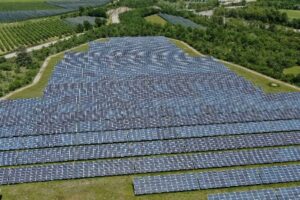Biomass Energy Pros And Cons

Biomass energy represents the renewable source of power obtained by burning wood and wood waste, organic waste produced by animals, municipal solid waste and garbage.
Biomass is also used to produce biogas and landfill gas, ethanol and even biodiesel.
Burning biogas, ethanol or biodiesel is also a form of biomass energy.
Plants are getting energy from the Sun through the photosynthesis process that stores energy from sunlight.
Animals are eating the plants and this way they are getting the energy stored by plants.
The energy stored by plants and animals is then turned into biomass energy when we burng waste products such as: crops, garbage and manure.
Biomass energy is considered a renewable energy source because the resources used to produce this type of low-carbon energy (plant waste, animal waste, human waste, garbage etc.) are produced continuously.
Pros Of Biomass Energy
Biomass energy cannot be compared with solar, wind, geothermal and tidal energy, in terms of greenhouse gas emissions produced to generate this energy.
However, biomass energy has more pros than cons, which makes it an alternative energy source that can successfully replace the dirty fossil fuels such as coal, oil and natural gas for a cleaner environment.
1. Biomass energy is a low-carbon energy source
Many people consider that biomass energy is a carbon neutral energy source because the carbon released while burning plant waste and animal waste forms a closed cycle (trees and plants re-absorb the carbon, which enters back in the growing cycle of the plants).
In my opinion, biomass energy is a low-carbon energy source because biomass produces a certain amount of greenhouse gas emissions while burning (lower than natural gas, but higher than other renewable energy sources).
2. Biomass energy is a renewable energy source
I mentioned before that biomass energy is generated while burning wood and plant waste, animal waste and also garbage, and because all these resources are produced continuously (trees regrow and waste is produced every day), biomass energy is considered a renewable energy source that will replace the fossil fuels for a cleaner environment.
3. Biomass is an abundant resource
Wood is available all over the planet, so wood waste is also available, animals and people are also all over the planet, so animal and human waste are present and available everywhere.
This is the reason why biomass energy can be produced all over the planet because the resource is abundant.
4. Biomass energy is cost-effective
Getting energy from biomass is much cheaper than burning fossil fuels such as coal, oil and natural gas.
Biomass is mostly produced from animal and plant waste, and this is the reason why this form of renewable energy is cheaper than the energy produced by burning fossil fuels.
Wood is widely used all over the planet for heating and cooking, mostly because is a natural resource that is cheaper than coal, oil and natural gas.
5. Reduces the use of fossil fuels
Biomass being produced from waste becomes cheaper than the fossil resources that are mostly used for cooking and heating such as by coal and natural gas.
Being a cheaper resource is widely used in many countries on the planet.
Biomass can also generate cheaper electricity, which means that by using biomass on a wide scale, we can reduce our dependency on fossil fuels.
6. Biomass has a wide range of uses
Biomass is used to produce electricity and heating, and also to power vehicles.
To produce electricity and for home heating, biomass represented by wood and plant waste are the perfect choice if you prefer a cheaper and cleaner fuel.
Organic waste is also used to produce biogas, while ethanol and biodiesel are used as cleaner fuels to power vehicles.
7. Biomass has great role in waste management
Biomass is mostly produced from plant and animal waste, but also from human waste such as organic waste and garbage.
Biomass represents the waste itself, so if we use biomass as fuel to generate electricity and heat we can say that we are turning the waste (garbage) into useful resources such as electricity and heating.
This way, biomass energy helps in waste management (by reducing them).
Cons Of Biomass Energy
Biomass energy is a renewable energy source that can replace the dirty fossil fuels, but has a few disadvantages.
1. Biomass is an inefficient source of power
Using biomass for heating and electricity production can be useful in terms of costs and for the environment, but a boiler that burns wood and plant waste is pretty inefficient if compared with other sources of power using fossil fuels.
Boilers using biomass are less efficient than the boilers burning fossil fuels.
A biomass boiler has an average efficiency of about 24%, while a boiler using coal has an average efficiency of about 33% (source eia.gov).
A boiler burning natural gas is even more efficient than biomass and coal boilers (around 43% efficiency).
2. Biomass is not a very clean energy source
Burning wood and plant waste produces smoke, which is harmful for the environment.
However, the level of greenhouse gas emissions released while burning biomass is smaller than the level of harmful emissions released while burning coal, oil or natural gas.
Natural gas is considered the cleanest fossil fuel in terms of emissions, but biomass produces less emissions than natural gas.
Overall, biomass energy produces the highest amount of emissions among all the other renewable energy sources.
3. Biomass requires a large storage area
Producing energy from biomass is a pretty complex process that requires a large storage area for wood and plant waste.
To produce biogas, organic waste must be stored in large plant digesters where the bacteria will consume the waste in an anaerobic environment.
However, biomass is a great source of clean power, so the large storage area required will not be a problem if we can reduce the overall consumption of fossil fuels.
4. Biomass power plants are a pretty expensive investment
Building a biomass power plant is a pretty expensive process, which in some cases has led to a stoppage of the investments made in such projects.
Extracting and transporting trees, plants and animal waste to the biomass power plant is also an expensive process.
All these processes required to gather, transport, store and turn the biomass into energy are creating the costs that are paid for biomass energy.
5. Can lead to deforestation
Biomass is mostly based on wood.
Wood waste and plant waste represent a major part of the biomass used to generate electricity and heat.
The idea to produce biomass energy on a large scale could lead in some areas of the planet to deforestation, which will not only affect the forest, but also the birds and the animals living there.
Final conclusion
Biomass energy is considered today an energy source of the future because is cleaner than the energy produced from fossil fuels and helps mankind to turn the huge amount of waste produced every day on the planet into useful energy.







